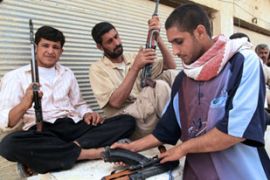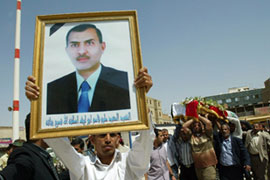Iraqi PM claims Basra ‘success’
Deal to end fighting with Shia fighters seem shaky amid sporadic violence.

| Your Views |
Figures compiled by the Iraqi interior, health and defence ministries said 923 civilians were killed last month, up 31 per cent from February.
Al-Maliki said he had decided to implement a seven-point programme in Basra following “the stability and success of the security plan which achieved the aim of imposing law in the city and restoring normalcy”.
The new plan includes boosting security forces in Basra by recruiting 10,000 new troops, restoring services, imposing a strict check on vehicles without licences, building new houses for the poor and turning government-owned palaces into tourist destinations.
However, on Tuesday the stability of the deal that ended the fighting looked shaky, with al-Sadr’s followers accusing the government of reneging on it promise not to round up its fighters.
‘Violation’
Harith al-Athari, chief of al-Sadr’s office in Basra, said the Mahdi Army was being “exposed to random arrests and raids, houses of the members were being burned. This is in violation of what has been agreed upon.”
 |
| March was the deadliest month for Iraqi civilians since last August [AFP] |
Nasir al-Isawi, a member of al-Sadr’s parliamentary bloc, said at least 70 members of the group had been arrested in one neighbourhood of the southern city of Hilla.
“This is very dangerous and it threatens the deal,” he said.
Iraqi and US officials have insisted that the operation was directed at criminals and rogue Shia fighters rather than the Sadrist movement, which controls 30 of the 275 seats in the national parliament.
Many analysts have suggested that the crackdown backfired for the government by exposing the weakness of the army and increasing support for al-Sadr’s movement.
“May God bless the families of the martyrs and ask God to give them patience for what God has chosen for them,” the Shia leader told
his followers in a written statement on Tuesday.
British delay
The fighting in Basra has also affected British plans to reduce troop levels from 4,100 to 2,500 in the spring.
“It is prudent that we pause any further reductions,” Des Browne, Britains’ defence secretary told parliament on Tuesday.
“It is absolutely right that military commanders review plans when the conditions on the ground change.”
British forces became directly involved in the current fighting for the first time at the weekend.
They fired upon a mortar position in an area in the north of Basra where Iraqi soldiers had been attacked.
Basra was taken by British forces in 2003. They later withdrew to a base at the city’s airport last autumn, before handing over security to the Iraq army in December.